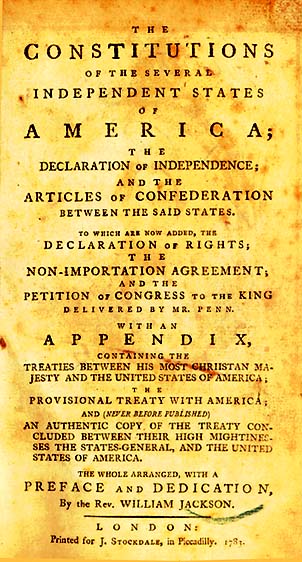
The Articles of Confederation
The Articles had many shortcomings, and these hindered the running of the new government. The states began to ignore the Articles. They also argued among themselves about the organization and powers of the new government.

The Articles of Confederation
The thirteen states had different opinions on how each state should be governed and what form the central government should adopt. Some of them wanted to give more power to the central government. Others wanted to protect the Rights of the states and give less power to the central government.
1. Economic Problems
The United States had borrowed
money heavily from foreign countries to fight the War of Independence.
Now they had to repay the loans with interest. But the government did not
have the power to collect taxes. Therefore, it was unable to raise money
to pay the debts. Also, the government was unable to improve the economy
because it had no power to regulate the trade between states. Each state
had its own economic policies. Some states even issued their own paper
money. This caused sharp changes in the value of currency and difficulties
in the nation's trade.
The War of Independence
brought economic difficulties to the farmers, especially those in the southern
states. They borrowed money from the rich merchants during the war. After
the war, they were unable to repay the debts, and mamy farmers were put
into prison, or had their farms confiscated. These problems therefore showed
that a stronger government was needed to maintain law and order.
2. The Need for a Strong Government
The new government also faced problems in foreign affairs.It was impossible for each of the thirteen states to send ministers to major European countries.
After independence, some states did not have fixed boundaries. This caused many disputes among the states, particularly those in the west.
Also, there was also a quarrel about the power each state should have.
It became clear that the states needed a strong government to settle their disputes and act as their representatives in foreign countries.
This stronger central government made the United States of America become a federal republic. It was a union of separate states under a central government. The states had to yield some of their freedoms to the central government in order to unite the nation. The constitution gave more powers to the federal government, including the rights to declare war, manage foreign affairs, collect taxes, regulate trade and issue currency.
The system of federal government is similar to the idea of Montesquieu, based on the separation of powers. It consists of three branches- executive, legislature and judiciary- which are represented by the President, Congress and the Supreme Court respectively. Congress makes the laws which the President enforces, and which the Supreme Court interprets if any question arises.